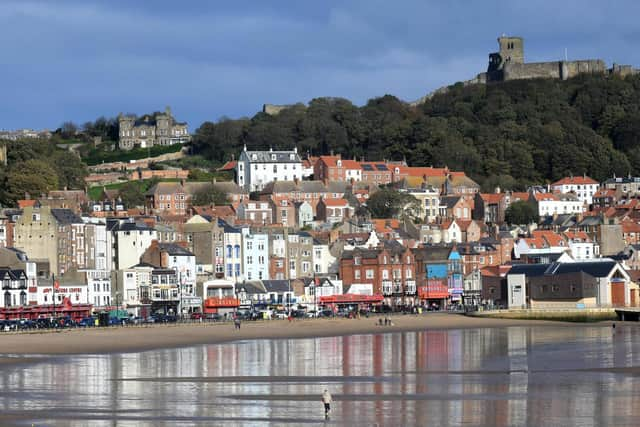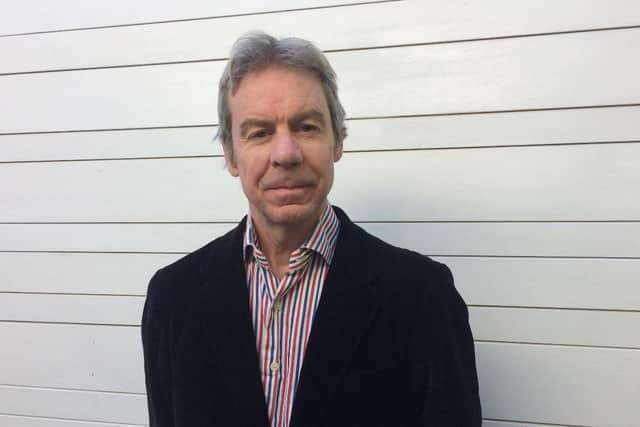'There's strong regional pride in Yorkshire' - county's past, present and quirks captured in new book
WHAT is it that makes Yorkshire unique? The people? Their outlook on life? The landscapes?
Everybody who lives in the county has their own opinion, and so do those who visit for work and holidays, or love the television dramas set here, whether the grittiness of Happy Valley or the gentleness of All Creatures Great and Small. Andrew Martin has his opinions too, and they inform his new book, Yorkshire There and Back, which seeks to get to the heart of what makes his native county special.
Advertisement
Hide AdAdvertisement
Hide AdIt is a wry, witty and personal perspective on what it is to be from Yorkshire, part memoir of growing up in York in the 1970s, and part exploration of the county’s past, present and quirks, ranging from navigating his home city’s Micklegate pubs to its breed of professional Yorkshiremen who dominated the television of his boyhood.


For Andrew, 59, his perspective is sharpened by distance. He has long lived in London, but returns regularly to Yorkshire. Its pull is also strongly felt in his award-winning series of historical crime novels featuring York railway detective Jim Stringer.
“I think I’ve been a closer observer of Yorkshire because I see it in instalments. I really clock the changes,” he says. “I wanted to write a book that would tell people who knew nothing about Yorkshire a lot about it, but telling it from a particular angle.
“And the angle is coming from York, which some people think isn’t proper Yorkshire in a way, it’s considered a bit too genteel, and the other thing is having left Yorkshire, but going back there very regularly.


Advertisement
Hide AdAdvertisement
Hide Ad“One thing that happened to me by leaving is that I do tend to think of Yorkshire as one unit, whereas if I’d stayed, I would have become allied to one particular part of it, so I suppose I romanticise the whole county because I’m viewing it from a distance.”
His own journey took him to London as a journalist and writer after Cambridge University, before an interlude when he studied law and considered moving back to Yorkshire to practise as a barrister. The ambition to write proved stronger and he is a prolific author of both fiction and non-fiction, much of which has a railway theme.
In his new book, Andrew weaves together reminiscence of the Yorkshire he grew up in with his observations of how it has changed. So the York of his childhood, a place of railways and the chocolate made by Rowntree’s and Terry’s, has reinvented itself as a tourist magnet.
Its bigger, brasher neighbour, Leeds, has gone from grim to glossy, though its Kirkgate Markets retain their quintessential Yorkshireness, and the Scarborough of family holidays still has the touch of the genteel that made it Britain’s first, and most fashionable, seaside resort.
Advertisement
Hide AdAdvertisement
Hide AdThe Dales and North Yorkshire Moors still have, for Andrew, a touch of danger amid their beauty, whilst Hull and Sheffield are places of quirky individuality that stand slightly apart from the Yorkshire mainstream in his telling.
Despite Yorkshire’s breadth and variety, Andrew believes that it has a common tone of voice, a balance of the dour and the whimsical, which is to be found in the writers the county has produced, from the Bronte sisters to Simon Armitage, via Ted Hughes and J B Priestley amongst others he quotes.
“There are lots of Yorkshires and lots of Yorkshire identities, and when I talk about the Yorkshire tone, I do think that’s something you can apply to the whole of Yorkshire,” he says. “I think I’m heavily influenced by being from Yorkshire, it stays with you even if you do leave it.
Over the years some people might take exception to some of my behaviour and I’ve come increasingly to think that it’s down to me being from Yorkshire. Basically some people think I’m rude, whereas I just think it’s because I’m from Yorkshire.
Advertisement
Hide AdAdvertisement
Hide Ad“I think they expect you to be a bit Heathcliff, a bit monosyllabic and terse, which is all stemming from the Brontes and Mrs Gaskell’s depiction of the Yorkshire character, which is that it’s a bit hard to know and flinty, and that idea has really stuck, because it generated a certain self-consciousness.
“I think it’s just that Yorkshire people are different from those in London. Northern people in general are as well, but Yorkshire is more different from London than anywhere else in the north.”
Nostalgia for the Yorkshire he grew up in runs through his writing, and as the county has changed and adapted, losing much of its heavy industry, something else has also been lost, he believes.
“Yorkshire was more like Yorkshire, it’s more globalised now. I don’t say it was better then, but it was more pungently northern. I don’t know what’s happening about Yorkshireness, I think there is definitely an attempt to portray a more inclusive image of the county now and be more cosmopolitan.”
Advertisement
Hide AdAdvertisement
Hide AdYet more than anywhere else in the north, Andrew believes the county has a sense of its own identity. “Regional pride is not as fashionable as it once was, but there is still is a strong regional pride in Yorkshire. One reason for the pride is that Yorkshire has been the main counterweight to London.
“It was the focus of the miners’ strike in the 80s, more so than Lancashire which has a tradition of working class Toryism, so Yorkshire thinks of itself as the capital of the north. In the 80s, there was real aggro about the north-south divide and now you have a sullen standoff. There’s an economic divide, but the cultural one is not so wide.”
One aspect of the narrowing of that cultural divide Andrew identifies is the demise of that figure so common in his childhood, and which as a young writer he aspired to be – the professional Yorkshireman, as exemplified by Michael Parkinson in his 1970s chat-show heyday.
It wasn’t only Sir Michael. There were also fast bowler Fred Trueman and grizzled countryman Jack Hargreaves, both of whom presented children’s programmes whilst smoking pipes, which would be greeted with horror today.
Advertisement
Hide AdAdvertisement
Hide Ad“There were lots of professional Yorkshiremen everywhere,” says Andrew. “It’s not as strong now. If you find out the Arctic Monkeys are from Yorkshire, you’re quite surprised about that.
Being from Yorkshire isn’t the first thing you think about them, whereas the first thing anybody would say about Michael Parkinson is that he’s from Yorkshire, it’s like a word association game. That’s faded, I don’t think that’s happening so much anymore because the world is more globalised, people aren’t as interested in regional identity.”
In a county as opinionated as Yorkshire, Andrew is unsure of how his take on it will be received. “I hope people will think, ‘I’m interested in Yorkshire, I might buy this book and see what he makes of the place I live in’. They don’t have to like me, in fact they might buy the book in order to see how annoyed I make them, but that’s fine.”
Yorkshire There and Back, by Andrew Martin, is published by Corsair, at £20.
